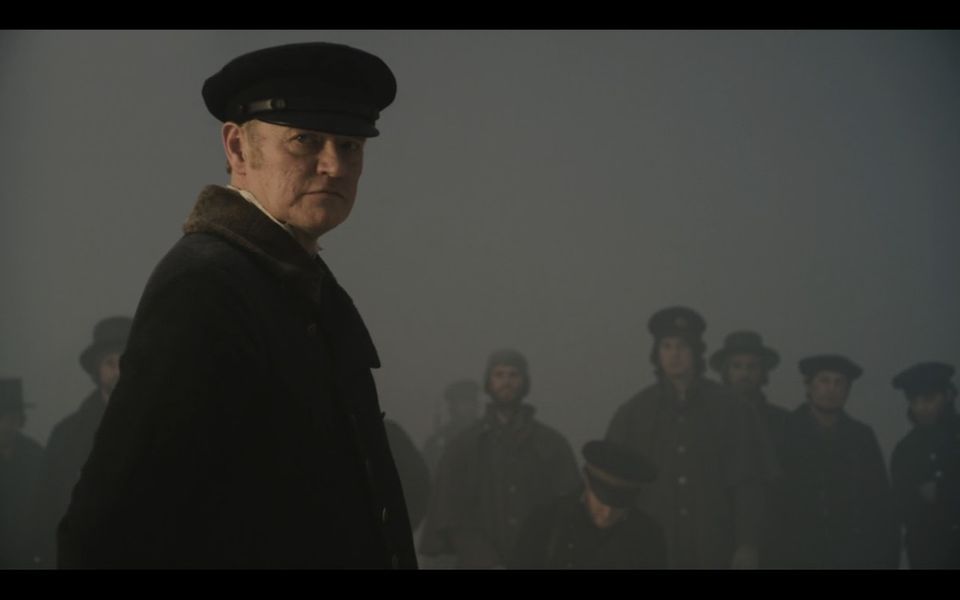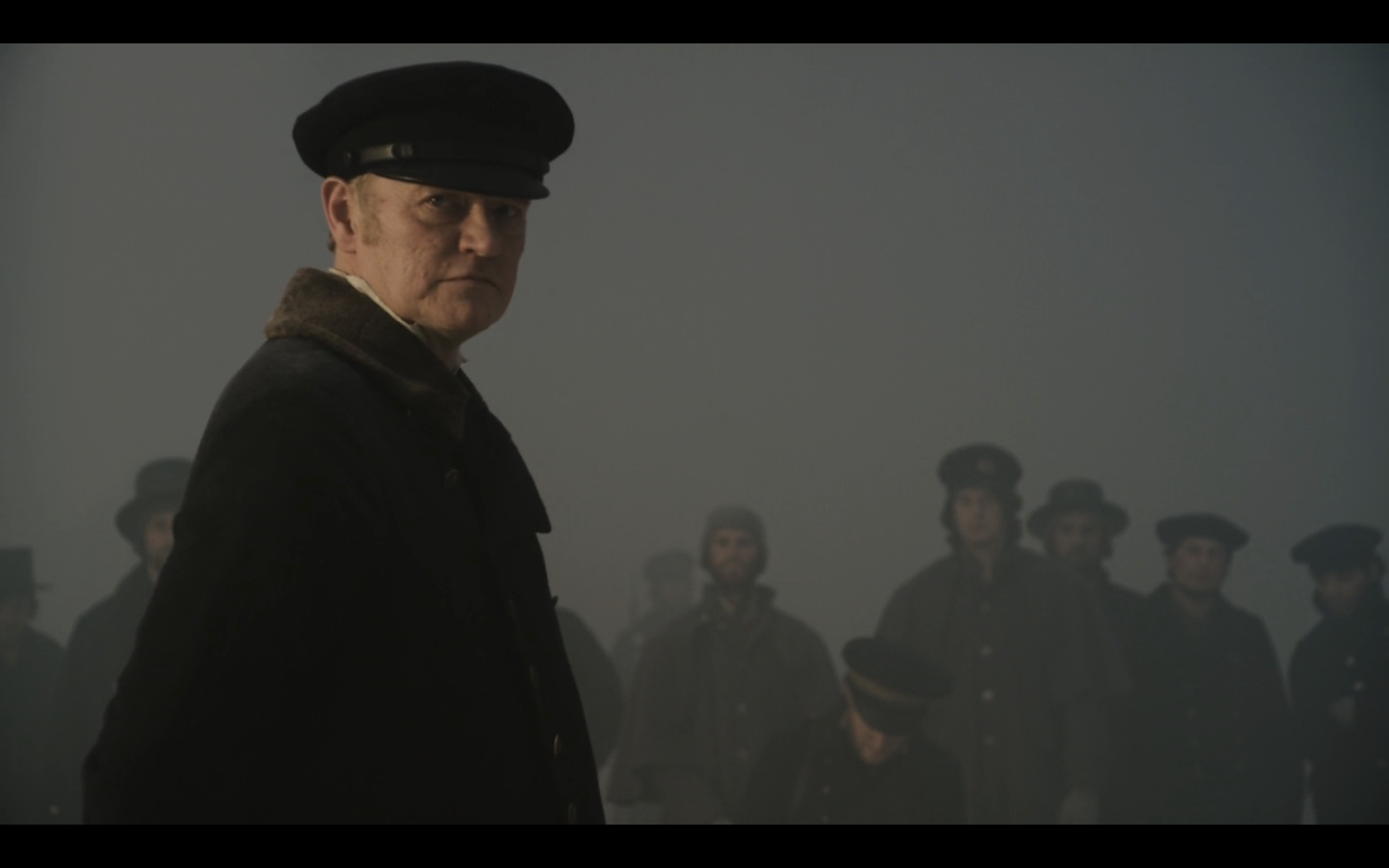Telling Lies on Erebus and Terror


The Terror is a math equation. Data goes in; data comes out. All the disasters of its last four episodes — when men eat each other among towers of dust — stem from the first five, which are about a dysfunctional office. The petty rivalries, the chipped shoulders, the eavesdropping and gossip, all run to blood on the ground. The most crucial moment is the transitional one, when one bank of numbers becomes the other. The sixth episode, “A Mercy,” is the equals sign, not because of the act of workplace violence at its center, but because it’s the first moment when Captain Francis Crozier asks for his crew’s trust.
Last month I was in a bad mood and rewatched The Terror. This month I was in a bad mood and rewatched it again. After writing a whole essay about Crozier’s morally complicated niceness, I found myself focusing this time on his rage, and his sloppy, dangerously uneven solidarity with other working-class men.
Or, well, not sloppy. Crozier’s a strategist. He never stops to chat, or has a man hanged, without reason. It sure as shit doesn’t look that way to his crew, though, who watch him invite Hickey in for a drink, then sentence him to be flogged. At various times, he’s surly, eloquent, fatherly, furious. After he comes to sobriety, his better qualities show through, to the point where he almost seems like a different person, but the act of becoming a different person is itself alarming to witness, especially when you’ve seen it before. Crozier always acts for the good of his crew, but when he is drinking, his perceptions of what’s good are inflected by the emotions and delusions of the moment. The floor of his thinking is wet and slippery, however stable we know him to be at the core. Of course people prefer to serve under James Fitzjames, who keeps discipline by busywork and larks, or Sir John Franklin, whose body doesn’t generate adrenaline. Crozier might not be the angry, mercurial drunk that he seems to be, but that doesn’t mean he’s not a different kind of angry, mercurial drunk.
I called Crozier a working-class man; that wasn’t really true. The show makes much of his rural Irish origins, and emphasizes his parallels with characters like Jopson and Hickey, who grew up poor — but in fact his father was a well-connected lawyer, a man with money who named his son after a powerful friend. The show also implies that Crozier was passed over for command of the expedition for reasons of his birth. In reality, he was offered that command, and turned it down, writing to his friend Sir James Ross that “I sincerely feel that I am not equal to the hardship. I am, in truth, still of opinion as to my own unfitness to lead.”
But good adaptations tell emotional truths. Crozier presumably was held back by his Irishness; he did feel passed over by Franklin, who ignored Crozier’s navigational and scientific expertise. He was something of an underachiever, for reasons that aren’t clear. I don’t know whether Dan Simmons (on whose book The Terror is nominally based) invented Crozier’s alcoholism. I do find it a plausible theory for why nobody, including Crozier, thought he was an entirely sound captain. It is in that realm of theory that his drinking stays throughout the series — the realm of euphemism, subtext, and lies.
People don’t name it, even when they’re talking about it. Fitzjames brings it up a few times, but it’s always a euphemism or a mumble, and he stands out among the officers for doing it at all. Everyone else speaks in the vaguest of glosses and platitudes. Crozier’s not about to detox, he’s “going to be ill, gentlemen.” He’s not from a line of alcoholics and ashamed of his class origins; rather, his “father drank gin.” Sophia Cracroft isn’t hesitant to marry him because of his drinking, but because she wants to marry an ambitious man, and wishes to “spare [him] my resentment later.” When she speaks of “bring[ing] one’s habits to marriage,” she’s nominally talking about his housekeeping. Most of the time, people don’t even go that far. They give him shell-shocked looks. They glance away at the crucial moment. They delicately ask if he needs anything from the spirit-room.
Of course this is all terribly Victorian, but it feels realistic at any time and place. After Franklin dies at the hands of a cryptid and a deep hole, Crozier is the captain, and he is drunk every day. Everyone approaches him carefully, tries to enable him or passive-aggressively stop him. He becomes the central, agonizing node of the ship’s consciousness. They struggle above all to trust him. It is this failed trust that allows Hickey to destroy Crozier long after he’s sober, just as Fitzjames’ six-year-old bullet wound kills him after scurvy sets in. Crozier calls Franklin’s foolish bravery “an act of hubris,” but of course this is writerly misdirection. The tragedy is that Crozier has blown the crew’s trust so badly that he can become a fountain of ever-loving light — and he damned near does — and still never get it back. Worse, he tries to restore it by lying more.
Crozier’s lies are constant. (Indeed, one of The Terror’s formal pleasures is that Hickey tells the truth more often than Crozier does.) His instincts stem from the need to keep his drinking secret, and when it comes time to deal with other difficult truths, he keeps those secret too. His is the instinct to euphemize, underplay, and misdirect. He is not going to recover from this easily, and he simply can’t do so while in a position of power. The result is that he fails to hold his crew together through their doomed journey, despite all of his skills, virtues, and love.
Crozier — as we learn from establishing shots of his cabin, O happy show which does not overemphasize a chess set — likes to play chess against himself. There’s nothing inherently wrong with being your own favorite opponent; actually, the chessboard seems like a steady sign that Crozier is keeping it together on some level, but it’s also a good metaphor for the obsessive privacy of his struggle. The thing about playing against yourself is that no one gets to see how smart and well-intentioned you are, or how much the game means to you. If they could, they might be more sympathetic, but as it is, they only see the pieces. I am super sorry, in other words, to report that John Franklin is as right about Crozier as Crozier is about Franklin.
All of this is not to condemn Crozier, a fictional portrayal of a man whose inner life and final struggle are lost to us. It’s absurd to condemn the protagonist of a tragedy. It’s just that at a certain point in our lives, subtext has to become text; euphemism has to give way to frankness, and lies to truth. You just have to hope it happens before you lose everybody.